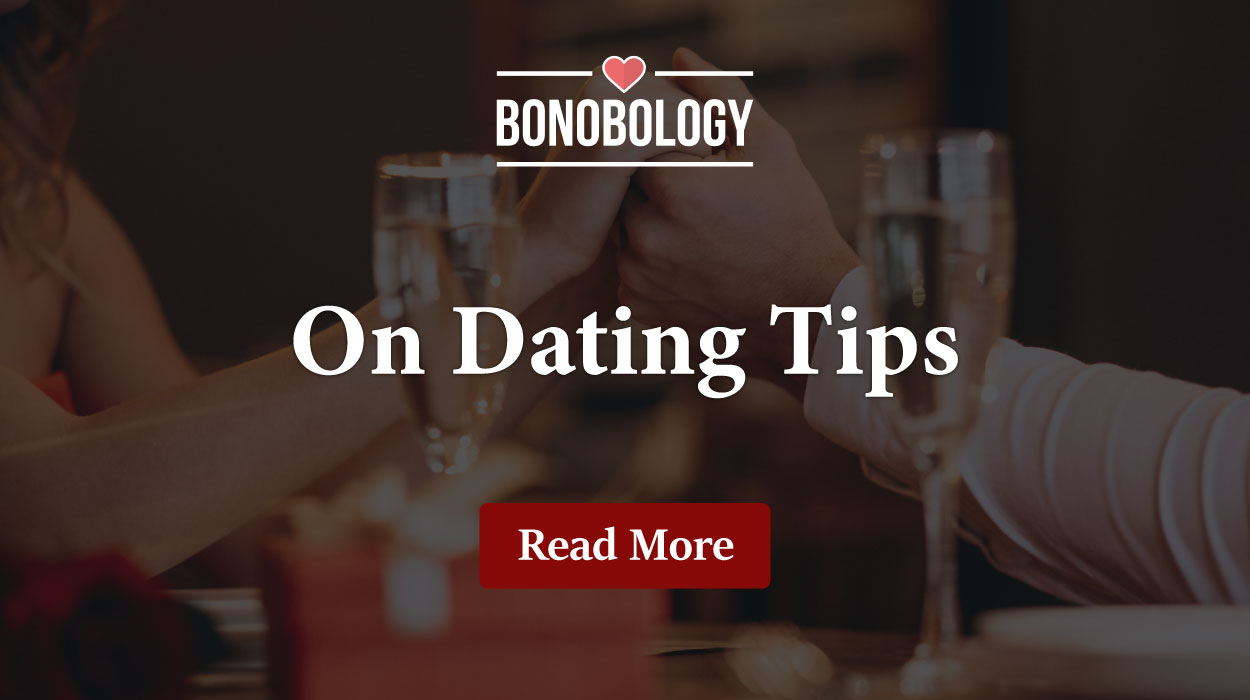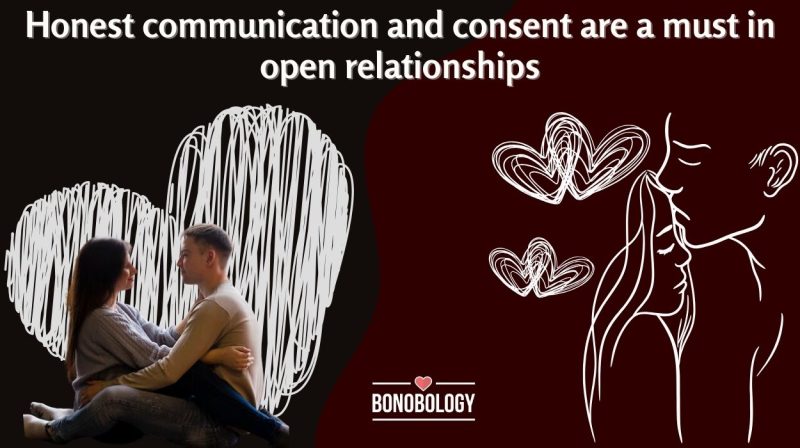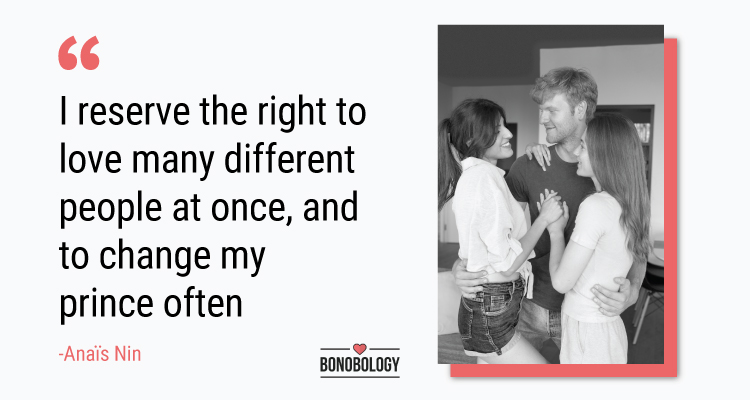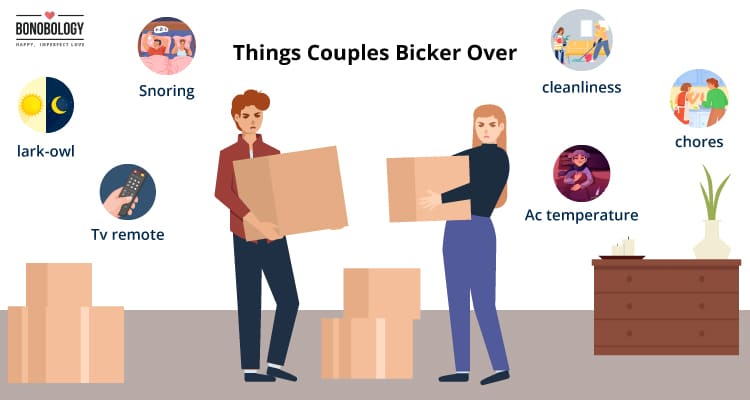The world has evolved a lot in recent years, and with it, the definition of relationships is becoming more and more fluid. There is no longer just one acceptable way of falling in love, building a family or life with one’s romantic partner/s. This changing landscape has also led to a lack of clarity about the structure and functioning of certain relationship types, especially for those who are looking at them from the outside or may want to explore them but don’t know how. Today, we address one such gray area: polyamorous vs polygamy.
These two terms weren’t part of the mainstream relationship structures until recently. Not a lot of people were open to the idea of having more than one partner. And those who did were tight-lipped about it. But now that people’s mindsets about these relationships are changing, it helps to be aware of how they function. To find out more about such poly relationships, we reached out to Dr. Ashish Paul, who specializes in Natural Fertility, Sacred Sexuality, and Holistic Medicine.
She says, “Since most people are only used to seeing monogamous relationships, it is plausible and unsurprising that people still get confused between these two terms. This confusion stems from one big similarity, the use of the word poly, which is the Greek word for “many”. While these two relationship types are not the same, they do have their share of similarities and differences.”
Polyamorous Vs Polygamy — What Do They Mean?
Table of Contents
While there may be many polyamorous vs polygamy differences, they do have one thing in common – they challenge the notion that a romantic partnership must look a certain way for it to be meaningful and successful. With that in mind, let’s take a closer look at the nuances of these two relationship types, starting with polygamy.
Polygamy is one of the types of non-monogamous relationships where a marriage involves at least three people. There is no limit to the number of partners you can have in a polygamous relationship as long as there is the consent of everyone involved. Dr. Paul says, “Polygamy means being married to more than one person.” Polygamy is of the following types:
- Polygyny relationships, where a man has more than one wife
- Polyandry relationships, where a woman has more than one husband
- Group marriage is another kind of polygamy where a group of people belonging to different sexes and genders live together and share a home
According to Pew Research Center, polygamy is legal in only a few countries including the Middle East and a few parts of Asia. However, it is not widely practiced despite being legal. Only 2% of the global population practice polygamy. The United Nations Human Rights Committee has even condemned polygamy and said that it violates the dignity of women.
Moving onto what is polyamory, Dr. Paul explains, “Polyamorous meaning can be understood by looking at the origins of this work. It is an amalgamation of two Greek words – Poly and Amor, meaning many and love. It loosely translates to multiple loves.”
This is another type of non-monogamous relationship where a person builds romantic connections with multiple partners with the knowledge and approval of everyone involved. It’s not cheating when it’s done with the consent of your partner. Even when a couple mutually decides to let other people enter the relationship, it becomes a polyamory relationship.
There are different types of polyamory relationships:
- Vee: It resembles the letter “V” where one partner has two partners but those two aren’t involved with each other but they have given their approval and consent to this relationship
- Triad: A triad is when three people are involved in a relationship. It could be one heterosexual couple with another man or woman in the scene or just three homosexual people in a sexual or romantic relationship. All three here are involved with each other
- Quad: When a couple gets involved with another couple, it’s one of the types of polyamory. All four here are sexually involved with each other
- Hierarchical polyamory: This is when one relationship is the main focus. A couple will live together, share expenses, and even be in love with each other. Their focus is their relationship but they can also see other people without letting it affect their primary relationship. It’s exactly like having an open relationship
- Non-hierarchical polyamory: This is when partners don’t prioritize any relationship. All they care about are their needs. Everyone has to take equal responsibility for the relationship and everyone has an equal say as to how the relationship will work
- Kitchen table polyamory: This type of relationship isn’t necessarily sexual or romantic. It’s like platonic relationships where couples just hang out with other couples or single people that they like and enjoy spending time with
- Parallel polyamory: Parallel polyamory is when one partner knows about their partner’s affair. They don’t mind it but they don’t like to interact with their significant other’s affair partner or maintain a rapport with them. All they care about is their relationship with their partner
- Solo-polyamory: A no-strings-attached relationship is the main priority here. The person is not involved in any serious relationship. They may have many casual relationships with no intention of getting serious
- Mono-poly relationship: Here one partner practices monogamy, whereas the other partner is free to have a polyamorous relationship with as many people as they want
Related Reading: The 8 Types Of Love And What They Mean For You
Key Differences In Polyamorous Vs Polygamy Relationship
Dr. Paul says, “Both polyamorous and polygamous are gender-neutral terms, which means these terms can be used in reference to men and women who have multiple partners. Even non-binary people who have multiple romantic partners come under this term.” Listed below are some of the key differences in polyamorous vs polygamy relationships:
| Polyamorous Relationship | Polygamy Relationship |
| You can be dating many people at the same time. This poly relationship doesn’t require you to be legally married. You can or cannot be married to practice a polyamory relationships | Polygamy is strictly restricted to married people. This means a married man having multiple wives or a married woman having multiple husbands. All the parties involved must be legally bound and committed |
| Anyone can practice polyamory regardless of whether or not their religion allows them to. But every person involved in the relationship has to follow all the polyamorous relationship rules | Mormons and Muslims can practice polygamy because it’s allowed in their religion to have more than one spouse. However, only Muslim men can have multiple wives. Muslim women can’t practice polygamy |
| This kind of relationship is an alternative to polygamy where they don’t have to worry about the legal ramifications of having multiple partners | Polygamy marriage is not legal in many countries, except in the Middle East and some parts of Africa and Asia. That’s why people resort to polyamory instead of polygamy |
How To Decide If A Poly Relationship Is Right For You
If you’ve always felt that the notion of “one partner for life” was too unrealistic or stifling for you, a poly relationship may sound like a whiff of fresh air by comparison. While it may sound like all fun and games, maintaining and navigating multiple romantic partnerships at the same time can be a lot more arduous than it seems. And provided you want to do it right, having multiple partners and maintaining poly relationships can be a huge responsibility. Before you dip your toes in the poly-verse, it’s important to assess if it will be right for you. Here are a few signs you can handle a poly relationship well:
1. You are comfortable
Dr. Paul says, “In a poly relationship, you will be involved with more than one person. That’s why it is crucial you find out your comfort level with each one of them. You need to be comfortable with all the parties involved to have a healthy poly relationship.” If you aren’t comfortable with even one of them, then you will need to talk to them about it and rethink being in a poly relationship with them.
2. You trust all of them
Dr. Paul says, “If you have major trust issues or insecurities, you will never be happy in such a relationship. You need to have high self-esteem to form successful poly relationships. Without it, you will constantly end up feeling jealous of one or the other person inside the circle.” Jealousy stems from insecurity. If you have insecurities, you need to work on them before giving poly relationships a chance. Otherwise, you will end up having more self-esteem issues than before.
Related Reading: 8 Open Relationship Rules That Have To Be Followed To Make It Work
3. You are financially stable
One important component you need to consider if you’re faced with a polyamorous vs polygamy choice is money. You need a lot of money to sustain polyandry or polygyny. If you are a man who has to provide for all the wives, which is customary in the Middle East, then you need to be rich or at least financially stable.
Likewise, if you are in a polyamorous relationship, you need to figure out how the finances will work, especially if you all live together or have shared expenses. You need to talk to each other about financial planning and agree on how the money will flow to prevent money problems from ruining your equation with your partners.
4. You can resolve conflicts easily
If you are good at conflict resolution, you can navigate poly relationships with greater ease because more people in a romantic equation means having to handle different problems. There will be fallouts, disagreements, and conflicts every now and then. You need to manage such situations as healthily as possible to keep the peace. If that doesn’t sound like something you’re equipped to handle, you need to work on it before you agree to be in a poly relationship.
5. Your partners make you happy
The entire point of being in such a relationship is to be happy. By happiness, we don’t mean to say it will be all rainbows and butterflies all the time. You may not even fall in love with every partner or romantic interest. But they should make you feel happy and content. Likewise, you should know how to make them happy and feel loved. However, if your partners don’t excite you and you feel terrible after meeting them, then you need to rethink the poly lifestyle.

Tips To Maintain Poly Relationships
Any discussion on polyamorous vs polygamy differences and similarities is incomplete without touching upon some rules for navigating these relationships. It’s a misnomer that you can do as you please in poly relationships since all the partners know about each other. There are certain things and tips you need to keep in mind if you want your relationships to work:
1. You need everyone’s consent
Consent in dating is very important and a poly relationship cannot work without everyone’s agreement. As simple as that. Otherwise, it’s plain old cheating. You have to let everyone involved know about the situation you are in and the kind of relationship you want this to become. Offer clear definitions of what you want. Here are some questions you can ask yourself before you get into a poly relationship:
- Is this going to be just sexual or do you want to get romantic with them and take them to dinner nights and spend quality time with them?
- How often are you going to meet them?
- Have you worked on your insecurities?
- Will you be able to manage all the partners’ expectations?
Related Reading: The 4 Bases In Relationships That We Unanimously Agree On
2. Don’t neglect your primary partner
If you are in a significant relationship, then you should make sure your partner is content and happy with whatever is happening. Don’t make them feel neglected. This is especially important if they aren’t participating in the poly relationship. In such a situation, it’s imperative that you remain transparent and let them know if you are going to meet your partners. When you come back home, don’t try to make them feel jealous or insecure by rubbing your experience in their face.
3. Always be mindful of contracting any STDs
When you are sexually involved with more than one person, it’s vital to practice safe sex. If one person gets infected, there are chances of all the partners getting infected. Take precautionary measures to protect yourself from STDs and unwanted pregnancies.
4. Establish ground rules and boundaries
You need to talk about and set boundaries as soon as you get into a poly relationship. If you don’t want to share any personal or professional details with your partner/s, tell them whatever is off-limits (sexually and emotionally).
5. Keep communicating with one another
Just like monogamous relationships, communication is important here as well. It’s the key to healthy relationships. If one of the partners feels like their emotions are not being validated, hear them out and find out where things are going wrong.
Key Pointers
- Polygamy is illegal in many countries whereas there are no such restrictions on polyamorous relationships
- One of the key differences in the polyamorous vs polygamy relationship is the former is more fluid and exists in different norms. There are no set rules and constructs, and it’s up to the people involved to define the terms of their relationship
- If you want to be in such a relationship, then you need to be a secure person without deep-seated insecurities or trust issues
- Good conflict resolution, transparency, communication, and consent are the cornerstones of happy poly relationships
The nuances of poly relationships can be far too complex for a lot of people. However, if you feel like it’s the right fit for you and you have confidence in your ability to navigate them, by all means, wade in and test the waters.
Platonic Cuddling – Meaning, Benefits, And How To Do It Right
Your contribution does not constitute a charitable donation. It will allow Bonobology to continue bringing you new and up-to-date information in our pursuit of helping anyone in the world to learn how to do anything.






















Featured
My Wife Wants Open Marriage: 17 Tips To Navigate
Open Relationship Dating: What It Is & Why It Works
13 Glaring Red Flags Before Moving In Together You Should Never Ignore
Polyamory Vs Open Relationship – 8 Key Differences (And Some Similarities)
How To Make A Polyamorous Marriage Work? 6 Expert Tips
Are You Moving In Together? Checklist From An Expert
21 Expert Tips For Couples Moving In Together
Non-Monogamous Relationship: Meaning, Types, Benefits
Decorating Tips For Couples Moving In Together
How Soon Is Too Soon To Move In Together?
Cohabitation – Everything You Need To Know About It
Does A Friends With Benefits Relationship Actually Work?
Tips To Ease Moving In With Your Boyfriend
10 Open Relationship Rules That Have To Be Followed To Make It Work
Does Living Together Before Marriage Mean You Are Ready For The Wedding?
Marriage VS Live-In Relationship: Everything You Wanted To Know
What Are The Disadvantages Of Live-In Relationships?
5 Things To Consider Before Beginning A Polyamorous Relationship
7 Creative Ways To Ask Your Girlfriend To Move In With You
My friend invited me to his house and I fell in love with his wife